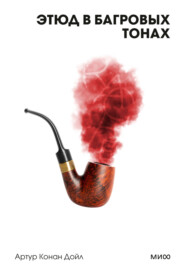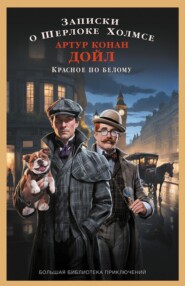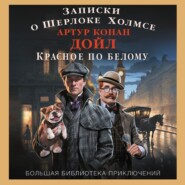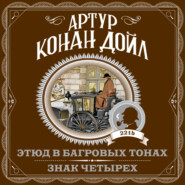По всем вопросам обращайтесь на: info@litportal.ru
(©) 2003-2024.
✖
The Green Flag, and Other Stories of War and Sport
Настройки чтения
Размер шрифта
Высота строк
Поля
"Not too far to walk?"
"Oh, no, we could walk there easily."
"We had better do so, then. A cabman's suspicions would be aroused if he dropped us both at some lonely spot in the dead of the night."
"Quite so. I think it would be best for us to meet at the Gate of the Appian Way at midnight. I must go back to my lodgings for the matches and candles and things."
"All right, Burger! I think it is very kind of you to let me into this secret, and I promise you that I will write nothing about it until you have published your report. Good-bye for the present! You will find me at the Gate at twelve."
The cold, clear air was filled with the musical chimes from that city of clocks as Burger, wrapped in an Italian overcoat, with a lantern hanging from his hand, walked up to the rendezvous. Kennedy stepped out of the shadow to meet him.
"You are ardent in work as well as in love!" said the German, laughing.
"Yes; I have been waiting here for nearly half an hour."
"I hope you left no clue as to where we were going."
"Not such a fool! By Jove, I am chilled to the bone! Come on, Burger, let us warm ourselves by a spurt of hard walking."
Their footsteps sounded loud and crisp upon the rough stone paving of the disappointing road which is all that is left of the most famous highway of the world. A peasant or two going home from the wine-shop, and a few carts of country produce coming up to Rome, were the only things which they met. They swung along, with the huge tombs looming up through the darkness upon each side of them, until they had come as far as the Catacombs of St. Calixtus, and saw against a rising moon the great circular bastion of Cecilia Metella in front of them. Then Burger stopped with his hand to his side. "Your legs are longer than mine, and you are more accustomed to walking," said he, laughing. "I think that the place where we turn off is somewhere here. Yes, this is it, round the corner of the trattoria. Now, it is a very narrow path, so perhaps I had better go in front, and you can follow." He had lit his lantern, and by its light they were enabled to follow a narrow and devious track which wound across the marshes of the Campagna. The great Aqueduct of old Rome lay like a monstrous caterpillar across the moonlit landscape, and their road led them under one of its huge arches, and past the circle of crumbling bricks which marks the old arena. At last Burger stopped at a solitary wooden cowhouse, and he drew a key from his pocket.
"Surely your catacomb is not inside a house!" cried Kennedy.
"The entrance to it is. That is just the safeguard which we have against anyone else discovering it."
"Does the proprietor know of it?"
"Not he. He had found one or two objects which made me almost certain that his house was built on the entrance to such a place. So I rented it from him, and did my excavations for myself. Come in, and shut the door behind you."
It was a long, empty building, with the mangers of the cows along one wall. Burger put his lantern down on the ground, and shaded its light in all directions save one by draping his overcoat round it. "It might excite remark if anyone saw a light in this lonely place," said he. "Just help me to move this boarding." The flooring was loose in the corner, and plank by plank the two savants raised it and leaned it against the wall. Below there was a square aperture and a stair of old stone steps which led away down into the bowels of the earth.
"Be careful!" cried Burger, as Kennedy, in his impatience, hurried down them. "It is a perfect rabbits'-warren below, and if you were once to lose your way there, the chances would be a hundred to one against your ever coming out again. Wait until I bring the light."
"How do you find your own way if it is so complicated?"
"I had some very narrow escapes at first, but I have gradually learned to go about. There is a certain system to it, but it is one which a lost man, if he were in the dark, could not possibly find out. Even now I always spin out a ball of string behind me when I am going far into the catacomb. You can see for yourself that it is difficult, but every one of these passages divides and subdivides a dozen times before you go a hundred yards." They had descended some twenty feet from the level of the byre, and they were standing now in a square chamber cut out of the soft tufa. The lantern cast a flickering light, bright below and dim above, over the cracked brown walls. In every direction were the black openings of passages which radiated from this common centre.
"I want you to follow me closely, my friend," said Burger. "Do not loiter to look at anything upon the way, for the place to which I will take you contains all that you can see, and more. It will save time for us to go there direct." He led the way down one of the corridors, and the Englishman followed closely at his heels. Every now and then the passage bifurcated, but Burger was evidently following some secret marks of his own, for he neither stopped nor hesitated. Everywhere along the walls, packed like the berths upon an emigrant ship, lay the Christians of old Rome. The yellow light flickered over the shrivelled features of the mummies, and gleamed upon rounded skulls and long, white arm-bones crossed over fleshless chests. And everywhere as he passed Kennedy looked with wistful eyes upon inscriptions, funeral vessels, pictures, vestments, utensils, all lying as pious hands had placed them so many centuries ago. It was apparent to him, even in those hurried, passing glances, that this was the earliest and finest of the catacombs, containing such a storehouse of Roman remains as had never before come at one time under the observation of the student. "What would happen if the light went out?" he asked, as they hurried on.
"I have a spare candle and a box of matches in my pocket. By the way,
Kennedy, have you any matches?"
"No; you had better give me some."
"Oh, that is all right. There is no chance of our separating."
"How far are we going? It seems to me that we have walked at least a quarter of a mile."
"More than that, I think. There is really no limit to the tombs – at least, I have never been able to find any. This is a very difficult place, so I think that I will use our ball of string." He fastened one end of it to a projecting stone and he carried the coil in the breast of his coat, paying it out as he advanced. Kennedy saw that it was no unnecessary precaution, for the passages had become more complexed and tortuous than ever, with a perfect network of intersecting corridors. But these all ended in one large circular hall with a square pedestal of tufa topped with a slab of marble at one end of it. "By Jove!" cried Kennedy in an ecstasy, as Burger swung his lantern over the marble. "It is a Christian altar – probably the first one in existence. Here is the little consecration cross cut upon the corner of it. No doubt this circular space was used as a church."
"Precisely," said Burger. "If I had more time I should like to show you all the bodies which are buried in these niches upon the walls, for they are the early popes and bishops of the Church, with their mitres, their croziers, and full canonicals. Go over to that one and look at it!" Kennedy went across, and stared at the ghastly head which lay loosely on the shredded and mouldering mitre.
"This is most interesting," said he, and his voice seemed to boom against the concave vault. "As far as my experience goes, it is unique. Bring the lantern over, Burger, for I want to see them all." But the German had strolled away, and was standing in the middle of a yellow circle of light at the other side of the hall.
"Do you know how many wrong turnings there are between this and the stairs?" he asked. "There are over two thousand. No doubt it was one of the means of protection which the Christians adopted. The odds are two thousand to one against a man getting out, even if he had a light; but if he were in the dark it would, of course, be far more difficult."
"So I should think."
"And the darkness is something dreadful. I tried it once for an experiment. Let us try it again!" He stooped to the lantern, and in an instant it was as if an invisible hand was squeezed tightly over each of Kennedy's eyes. Never had he known what such darkness was. It seemed to press upon him and to smother him. It was a solid obstacle against which the body shrank from advancing. He put his hands out to push it back from him. "That will do, Burger," said he, "let's have the light again."
But his companion began to laugh, and in that circular room the sound seemed to come from every side at once. "You seem uneasy, friend Kennedy," said he.
"Go on, man, light the candle!" said Kennedy, impatiently.
"It's very strange, Kennedy, but I could not in the least tell by the sound in which direction you stand. Could you tell where I am?"
"No; you seem to be on every side of me."
"If it were not for this string which I hold in my hand I should not have a notion which way to go."
"I dare say not. Strike a light, man, and have an end of this nonsense."
"Well, Kennedy, there are two things which I understand that you are very fond of. The one is adventure, and the other is an obstacle to surmount. The adventure must be the finding of your way out of this catacomb. The obstacle will be the darkness and the two thousand wrong turns which make the way a little difficult to find. But you need not hurry, for you have plenty of time, and when you halt for a rest now and then, I should like you just to think of Miss Mary Saunderson, and whether you treated her quite fairly."
"You devil, what do you mean?" roared Kennedy. He was running about in little circles and clasping at the solid blackness with both hands.
"Good-bye," said the mocking voice, and it was already at some distance. "I really do not think, Kennedy, even by your own showing that you did the right thing by that girl. There was only one little thing which you appeared not to know, and I can supply it. Miss Saunderson was engaged to a poor, ungainly devil of a student, and his name was Julius Burger." There was a rustle somewhere – the vague sound of a foot striking a stone – and then there fell silence upon that old Christian church – a stagnant heavy silence which closed round Kennedy and shut him in like water round a drowning man.
Some two months afterwards the following paragraph made the round of the
European Press: —
One of the most interesting discoveries of recent years is that of the new catacomb in Rome, which lies some distance to the east of the well-known vaults of St. Calixtus. The finding of this important burial-place, which is exceedingly rich in most interesting early Christian remains, is due to the energy and sagacity of Dr. Julius Burger, the young German specialist, who is rapidly taking the first place as an authority upon ancient Rome. Although the first to publish his discovery, it appears that a less fortunate adventurer had anticipated Dr. Burger. Some months ago Mr. Kennedy, the well-known English student, disappeared suddenly from his rooms in the "Corso", and it was conjectured that his association with a recent scandal had driven him to leave Rome. It appears now that he had in reality fallen a victim to that fervid love of archaeology which had raised him to a distinguished place among living scholars. His body was discovered in the heart of the new catacomb, and it was evident from the condition of his feet and boots that he had tramped for days through the tortuous corridors which make these subterranean tombs so dangerous to explorers. The deceased gentleman had, with inexplicable rashness, made his way into this labyrinth without, as far as can be discovered, taking with him either candles or matches, so that his sad fate was the natural result of his own temerity. What makes the matter more painful is that Dr. Julius Burger was an intimate friend of the deceased. His joy at the extraordinary find which he has been so fortunate as to make has been greatly marred by the terrible fate of his comrade and fellow-worker.
THE DEBUT OF BIMBASHI JOYCE
It was in the days when the tide of Mahdism, which had swept in such a flood from the great Lakes and Darfur to the confines of Egypt, had at last come to its full, and even begun, as some hoped, to show signs of a turn. At its outset it had been terrible. It had engulfed Hicks's army, swept over Gordon and Khartoum, rolled behind the British forces as they retired down the river, and finally cast up a spray of raiding parties as far north as Assouan. Then it found other channels to east and west, to Central Africa and to Abyssinia, and retired a little on the side of Egypt. For ten years there ensued a lull, during which the frontier garrisons looked out upon those distant blue hills of Dongola. Behind the violet mists which draped them lay a land of blood and horror. From time to time some adventurer went south towards those haze-girt mountains, tempted by stories of gum and ivory, but none ever returned. Once a mutilated Egyptian and once a Greek woman, mad with thirst and fear, made their way to the lines. They were the only exports of that country of darkness. Sometimes the sunset would turn those distant mists into a bank of crimson, and the dark mountains would rise from that sinister reek like islands in a sea of blood. It seemed a grim symbol in the southern heaven when seen from the fort-capped hills by Wady Halfa. Ten years of lust in Khartoum, ten years of silent work in Cairo, and then all was ready, and it was time for civilisation to take a trip south once more, travelling as her wont is in an armoured train. Everything was ready, down to the last pack-saddle of the last camel, and yet no one suspected it, for an unconstitutional Government has its advantage. A great administrator had argued, and managed, and cajoled; a great soldier had organised and planned, and made piastres do the work of pounds. And then one night these two master spirits met and clasped hands, and the soldier vanished away upon some business of his own. And just at that very time, Bimbashi Hilary Joyce, seconded from the Royal Mallow Fusiliers, and temporarily attached to the Ninth Soudanese, made his first appearance in Cairo.
Napoleon had said, and Hilary Joyce had noted, that great reputations are only to be made in the East. Here he was in the East with four tin cases of baggage, a Wilkinson sword, a Bond's slug-throwing pistol, and a copy of "Green's Introduction to the Study of Arabic." With such a start, and the blood of youth running hot in his veins, everything seemed easy. He was a little frightened of the general; he had heard stories of his sternness to young officers, but with tact and suavity he hoped for the best. So, leaving his effects at "Shepherd's Hotel," he reported himself at headquarters. It was not the general, but the head of the Intelligence Department who received him, the chief being still absent upon that business which had called him. Hilary Joyce found himself in the presence of a short, thick-set officer, with a gentle voice and a placid expression which covered a remarkably acute and energetic spirit. With that quiet smile and guileless manner he had undercut and outwitted the most cunning of Orientals. He stood, a cigarette between his fingers, looking at the newcomer. "I heard that you had come. Sorry the chief isn't here to see you. Gone up to the frontier, you know."
"My regiment is at Wady Halfa. I suppose, sir, that I should report myself there at once?"
"No; I was to give you your orders." He led the way to a map upon the wall, and pointed with the end of his cigarette. "You see this place. It's the Oasis of Kurkur – a little quiet, I am afraid, but excellent air. You are to get out there as quick as possible. You'll find a company of the Ninth, and half a squadron of cavalry. You will be in command."
Hilary Joyce looked at the name, printed at the intersection of two black lines without another dot upon the map for several inches around it. "A village, sir?"
"No, a well. Not very good water, I'm afraid, but you soon get accustomed to natron. It's an important post, as being at the junction of two caravan routes. All routes are closed now, of course, but still you never know who might come along them."

















